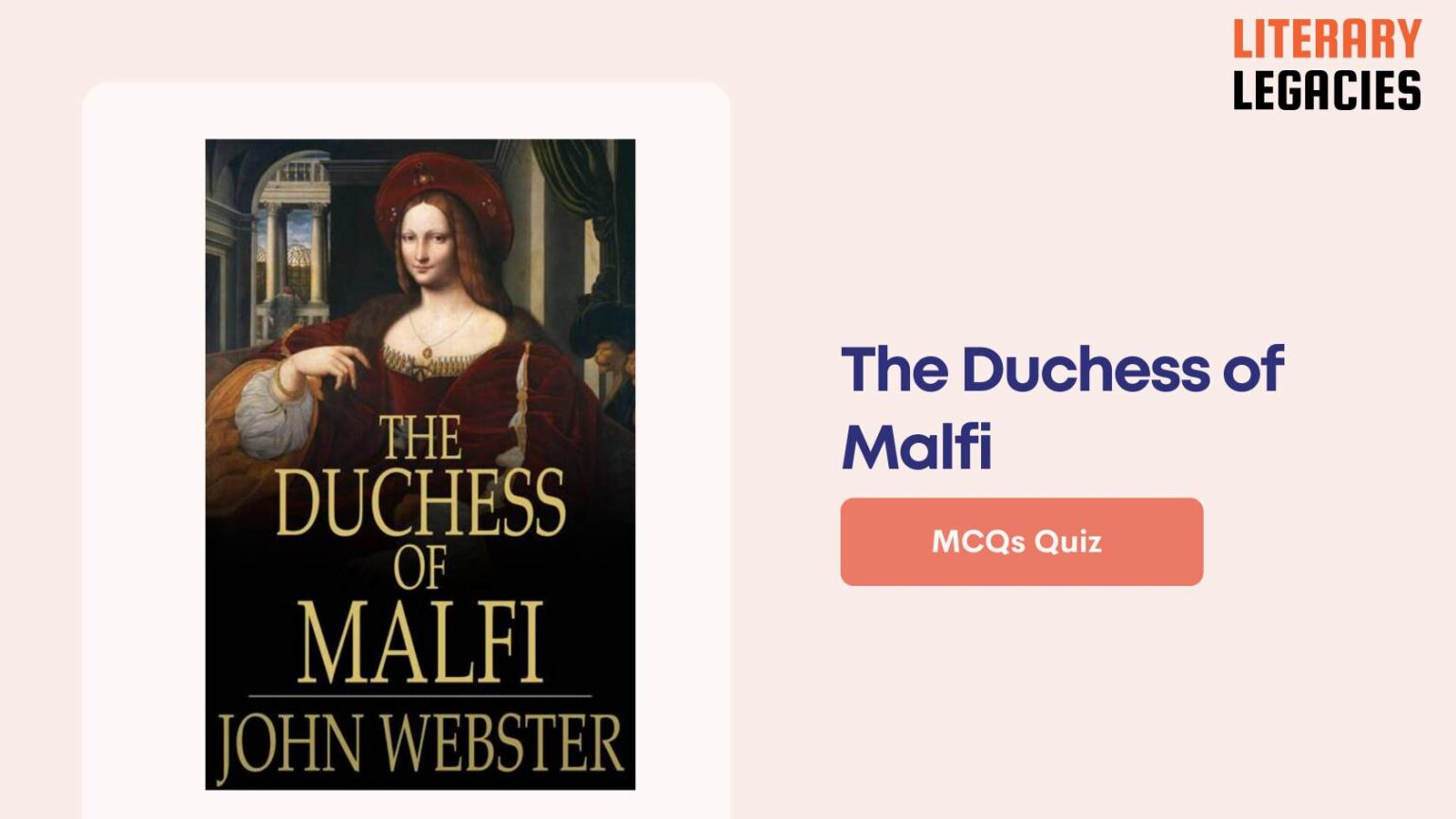1. What is the setting of the play The Duchess of Malfi?
A. French court
B. Roman Catholic Italy
C. English court
D. Italian town of Amalfi
Answer: Roman Catholic Italy (B)
The play takes place in Roman Catholic Italy, which would have been associated with corruption by English audiences at the time.
2. What is the occupation of Bosola in the play?
A. Murderer and former employee of the Cardinal
B. Delio’s friend
C. Steward to the Duchess
D. Duke Ferdinand’s advisor
Answer: Murderer and former employee of the Cardinal (A)
Bosola is a murderer and former employee of the Cardinal, and is later hired as a spy by Duke Ferdinand.
3. Why do the Duchess’s brothers want her to remain a widow?
A. To ensure her ongoing sexual purity and to inherit her fortune
B. To protect her from marrying a corrupt man
C. To allow her to focus on her duties as a ruler
D. To make her a nun
Answer: To ensure her ongoing sexual purity and to inherit her fortune (A)
The Duchess’s brothers want her to remain a widow to preserve their honor and to eventually inherit her fortune.
4. What does Antonio reveal about the Duchess’s brothers in his conversation with Delio?
A. They are wise and just rulers
B. They are jealous, conniving, and despicable
C. They are noble and honest
D. They are wealthy and powerful
Answer: They are jealous, conniving, and despicable (B)
Antonio reveals that though the Cardinal and Duke appear good, they are in fact jealous, conniving, and despicable.
5. What does the Duchess’s brothers hope to achieve by instructing her not to remarry?
A. To ensure her happiness and well-being
B. To punish her for her past mistakes
C. To make her a more effective ruler
D. To preserve their honor and inherit her fortune
Answer: To preserve their honor and inherit her fortune (D)
The Duchess’s brothers hope to preserve their honor and inherit her fortune by instructing her not to remarry.
6. What is the character of the Duchess according to Antonio?
A. Ambitious and power-hungry
B. Cruel and manipulative
C. Weak and submissive
D. Noble, temperate, beautiful, and intelligent
Answer: Noble, temperate, beautiful, and intelligent (D)
Antonio describes the Duchess as noble, temperate, beautiful, and intelligent.
7. Why does Bosola agree to be a spy for Duke Ferdinand?
A. Because he feels it is his duty to obey the Duke
B. Because he wants to gain power and wealth
C. Because he is loyal to the Cardinal
D. Because he wants to betray the Duchess
Answer: Because he feels it is his duty to obey the Duke (A)
Bosola agrees to be a spy because he feels it is his duty to obey the Duke, even though it makes him corrupt.
8. What is the position that Bosola is given on the Duchess’s estate?
A. Spy for Duke Ferdinand
B. Steward to the Duchess
C. Advisor to the Cardinal
D. Guard to the palace
Answer: Spy for Duke Ferdinand (A)
Bosola is given the position of spy for Duke Ferdinand on the Duchess’s estate.
9. What is the relationship between Antonio and Delio?
A. Enemies
B. Brothers
C. Friends
D. Master and servant
Answer: Friends (C)
Antonio and Delio are friends, and have a private conversation in which Antonio reveals his true feelings about the Duchess’s brothers.
10. What is the motivation behind the Cardinal and Duke’s actions towards the Duchess?
A. They want to protect her from harm
B. They want to punish her for her past mistakes
C. They want to help her become a better ruler
D. They want to control her and her fortune
Answer: They want to control her and her fortune (D)
The Cardinal and Duke are motivated by a desire to control the Duchess and her fortune, and to preserve their own honor and power.
11. What does Ferdinand condemn Bosola for?
A. Failing to follow his orders
B. Refusing to take payment
C. Murdering the Duchess
D. Following his orders
Answer: Following his orders (D)
Ferdinand initially ordered Bosola to kill the Duchess, but then refuses to pay him for his work.
12. What is Ferdinand diagnosed with?
A. Madness
B. Guilt
C. Insanity
D. Lycanthropia
Answer: Lycanthropia (D)
Ferdinand’s diagnosis leads to him acting strangely and erratically.
13. What does the Cardinal instruct Bosola to do?
A. Murder the Duchess
B. Help Julia
C. Murder Antonio
D. Confront the Cardinal
Answer: Murder Antonio (C)
The Cardinal wants Antonio dead to keep his involvement in the murder secret.
14. What happens to Julia?
A. She becomes smitten with Bosola
B. She escapes from the Cardinal
C. She confesses to the Cardinal
D. She is forced to kiss a poisoned book
Answer: She is forced to kiss a poisoned book (D)
The Cardinal kills Julia to keep his secret safe.
15. What does Bosola intend to do after overhearing the Cardinal’s plan?
A. Save Antonio and get revenge on the brothers
B. Abandon the situation
C. Kill the Cardinal immediately
D. Help the Cardinal kill Antonio
Answer: Save Antonio and get revenge on the brothers (A)
Bosola decides to trick the Cardinal and help Antonio instead.
16. Who does Bosola accidentally stab in the darkness?
A. The Cardinal
B. Antonio
C. Ferdinand
D. Julia
Answer: Antonio (B)
Bosola mistakes Antonio for one of the brothers in the darkness.
17. Why do the Cardinal’s courtiers stay away from his room?
A. They are investigating the murder
B. They are afraid of the Cardinal
C. They are following the Cardinal’s instruction
D. They are waiting for Bosola
Answer: They are following the Cardinal’s instruction (C)
The Cardinal instructs his courtiers to stay away, no matter what they hear.
18. What does Ferdinand mistake his brother for when he stabs him?
A. Antonio
B. Bosola
C. The devil
D. A stranger
Answer: The devil (C)
Ferdinand mistakenly stabs the Cardinal, thinking he is the devil.
19. Who enters the scene after all the deaths?
A. Delio
B. The Cardinal
C. Bosola
D. Antonio’s son
Answer: Delio (A)
Delio arrives to help Antonio’s son receive his proper inheritance.
20. What does Ferdinand use his dying words to say?
A. Our lives are in our own hands
B. Our deaths are caused by our own actions
C. The devil is responsible for our downfall
D. Bosola is to blame for everything
Answer: Our deaths are caused by our own actions (B)
Ferdinand’s final words provide a reflection on the cause of their downfall.
21. What is the Duchess’s plan after knowing that her brothers have discovered her secret marriage?
A. To flee to Milan with her husband
B. To confess to her brothers about her marriage
C. To flee to Rome with her children
D. To stay in Amalfi and face her brothers
Answer: To flee to Milan with her husband (A)
The Duchess and Antonio plan to flee to Milan to escape her brothers’ wrath.
22. Why does Bosola give the Duchess apricots?
A. To test her and reveal her secret
B. To poison her and her unborn child
C. To congratulate her on her pregnancy
D. To help her recover from illness
Answer: To test her and reveal her secret (A)
Bosola gives the Duchess apricots to induce labor and reveal her secret pregnancy.
23. What does Antonio inadvertently drop, which reveals the Duchess’s secret to Bosola?
A. A letter to the Duchess
B. A note from Ferdinand
C. A gift for the Duchess’s child
D. A piece of paper with a horoscope for a baby
Answer: A piece of paper with a horoscope for a baby (D)
Antonio accidentally drops a piece of paper with a horoscope for a baby, which Bosola finds and sends to Ferdinand and the Cardinal.
24. What is Ferdinand’s reaction when he confronts the Duchess about her marriage?
A. He is overwhelmed with joy
B. He is filled with rage and anger
C. He is surprised but understanding
D. He is indifferent to the situation
Answer: He is filled with rage and anger (B)
Ferdinand is enraged when he confronts the Duchess about her marriage to Antonio.
25. What is the Cardinal’s response to the Duchess’s situation?
A. He refuses to get involved in the situation
B. He tries to reason with Ferdinand
C. He offers to help the Duchess and Antonio
D. He formally banishes the Duchess and her family
Answer: He formally banishes the Duchess and her family (D)
The Cardinal formally banishes the Duchess, Antonio, and their children from the kingdom.
26. What does Ferdinand use to trick the Duchess into believing Antonio is dead?
A. A fake news report
B. A fake letter from Antonio
C. The hand of a dead man
D. A silhouette of Antonio’s ghost
Answer: The hand of a dead man (C)
Ferdinand tricks the Duchess into believing Antonio is dead by giving her the hand of a dead man to hold.
27. What is the fate of the Duchess, her children, and Cariola?
A. They are strangled to death
B. They are imprisoned in the palace
C. They are banished from the kingdom
D. They are forced into exile
Answer: They are strangled to death (A)
The Duchess, her children, and Cariola are ultimately strangled to death on Ferdinand’s orders.
28. How does Ferdinand feel after seeing the Duchess’s dead body?
A. He feels indifferent
B. He feels victorious
C. He feels remorseful and guilty
D. He feels angry
Answer: He feels remorseful and guilty (C)
Ferdinand feels remorse and guilt after seeing the Duchess’s dead body.
29. What is Bosola’s role in the play?
A. He is the Duchess’s husband
B. He is the Duchess’s loyal servant
C. He is the Cardinal’s advisor
D. He is Ferdinand’s spy and servant
Answer: He is Ferdinand’s spy and servant (D)
Bosola is Ferdinand’s spy and servant, tasked with keeping an eye on the Duchess.
30. What is the Duchess’s attitude when faced with death?
A. She is calm and unafraid
B. She is sorrowful and regretful
C. She is angry and defiant
D. She is fearful and begging for mercy
Answer: She is calm and unafraid (A)
The Duchess maintains her composure and is unafraid when faced with death.
31. What drives the tragic forces of the play’s major plotline?
A. The Duchess’s desire for power
B. The love triangle between the Duchess, Antonio, and Ferdinand
C. The Duchess’s pursuit of wealth and nobility
D. The greed and pride of the Cardinal and the Duke
Answer: The greed and pride of the Cardinal and the Duke (D)
The greed and pride of the Cardinal and Duke are the primary motivators of their actions against the Duchess.
32. Why is the Duchess’s marriage to Antonio remarkable?
A. Because Antonio was of a higher noble class
B. Because she married against her brothers’ will
C. Because she was the pursuer
D. Because it was a loveless arrangement
Answer: Because she married against her brothers’ will (B)
The Duchess’s marriage to Antonio was remarkable because she married against her brothers’ will and married someone of a lower class.
33. What is a prominent theme in The Duchess of Malfi?
A. The power of love and relationships
B. The importance of social class
C. The struggle for power and nobility
D. The consequences of sin and guilt
Answer: The consequences of sin and guilt (D)
The play explores the consequences of sin and guilt, particularly in the actions of the Cardinal and the Duke.
34. What is distinct about the Duchess’s attitude towards death?
A. She is eager for it
B. She is composes and dignified in the face of it
C. She is terrified of it
D. She is indifferent to it
Answer: She is composes and dignified in the face of it (B)
The Duchess possesses composure and dignity in the moments leading up to her execution.
35. What motivates the Cardinal and the Duke’s actions towards the Duchess?
A. A need to punish her for her sins
B. Greed and pride due to her fortune and noble blood
C. A wish to see her happy
D. A desire to protect her from harm
Answer: Greed and pride due to her fortune and noble blood (B)
The Cardinal and Duke’s actions are driven by their greed and pride, motivated by her fortune and noble blood.
36. What is notable about Antonio’s behavior during his courtship with the Duchess?
A. He was dismissive of her feelings
B. He was overly ambitious
C. He was deceitful about his intentions
D. He was careful not to appear too ambitious
Answer: He was careful not to appear too ambitious (D)
Antonio was careful not to appear too ambitious, as it was considered dangerous for someone of a lower class.
37. What is a significant aspect of the Duchess’s marriage to Antonio?
A. It was arranged by her brothers
B. It was a secret marriage
C. It was a marriage between two people of the same class
D. It was a marriage between a noble and a person of a lower class
Answer: It was a marriage between a noble and a person of a lower class (D)
The Duchess’s marriage to Antonio was remarkable because she married someone of a lower class.
38. What is associated with the stereotype of ‘sophisticated corruption’ in English Renaissance audiences?
A. French court
B. The Cardinal’s court
C. The Duchess of Malfi’s estate
D. Roman Catholic Italy
Answer: Roman Catholic Italy (D)
The Duchess of Malfi takes place in Roman Catholic Italy, which is associated with the stereotype of ‘sophisticated corruption’ in English Renaissance audiences.
39. What is a theme explored in the relationship between the Duchess and Antonio?
A. The power of love and relationships
B. The consequences of sin and guilt
C. The struggle for power and nobility
D. The importance of social class
Answer: The importance of social class (D)
The play explores the theme of social class, particularly in the relationships between characters of different classes.
40. What is the central theme of the play’s beginning?
A. Guilt, Death, and Suffering
B. Politics and Corruption
C. The Duchess’s marriage
D. Love and Male Authority
Answer: Politics and Corruption (B)
The play begins with Antonio’s speech about his recent return from the French court, praising France and offering the play’s notion of an ideal royal state, which is related to the theme of Politics and Corruption.
41. What is Ferdinand’s motivation towards his sister?
A. He wants to protect her from harm
B. He has an incestuous desire for her
C. He wants to help her with her problems
D. He is jealous of her marriage
Answer: He has an incestuous desire for her (B)
Ferdinand exhibits a strange incestuous desire for his sister, which contributes to his horrible treatment of her.



